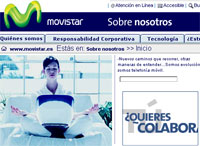 Abertis Telecom, Nokia and Telefonica Moviles Espana have emerged smiling from a big converging huddle with news of a mobile TV pilot using Digital Video Broadcasting-Handheld (DVB-H) technology.
Abertis Telecom, Nokia and Telefonica Moviles Espana have emerged smiling from a big converging huddle with news of a mobile TV pilot using Digital Video Broadcasting-Handheld (DVB-H) technology.
The project, backed by major regional and local Spanish channels, is said to be the first of its kind to take place in the country and will serve up a feast of converged mobile communications and TV broadcasting technologies.
Scheduled to take place in Madrid and Barcelona from September 2005 to February 2006, the pilot will also coincide with the closing ceremony of the GSM World Congress 2006 in Barcelona.
The trial will let 500 lucky users from Madrid and Barcelona gorge themselves on high quality broadcast TV content from Antena 3, Sogecable, Telecinco, Telemadrid, TVE and TV3 on Nokia 7710 smartphones.
 These will be equipped with a “special accessory” to receive the mobile TV broadcasts.
These will be equipped with a “special accessory” to receive the mobile TV broadcasts.
With the units sporting a wide (640 x 320 pixels) colour touch-screen and a built in stereo music player, users will also be able to take part in programme-related interactive services while viewing TV.
White coated boffins have already started technical trials, with the consumer pilot designed to allow the three companies to test the feasibility of the DVB-H technology and the new mobile TV services.
The trial will also allow interested parties to assess new business opportunities, tweak the user experience (ooo-er!) and measure public interest in mobile TV services.
 Outdoor and indoor signal and broadcast quality will also be tested to help fine tune the best technical parameters for the viability of DVB-H based services.
Outdoor and indoor signal and broadcast quality will also be tested to help fine tune the best technical parameters for the viability of DVB-H based services.
The deal gives Telefonica Moviles responsibility for customer support, invoicing and interactive services, Abertis Telecom will be charged with broadcasting the programmes in Madrid and Barcelona – and taking care of technical issues – while Nokia will provide the Mobile TV solution and smartphones for the pilot.
 Around a hundred rural African farmers around Makuleke are testing cell phone technology that gives them access to national markets via the Internet, allowing them to compete with the big boys and boost profits by at least 30 percent.
Around a hundred rural African farmers around Makuleke are testing cell phone technology that gives them access to national markets via the Internet, allowing them to compete with the big boys and boost profits by at least 30 percent. It’s believed that wireless technology is the best way to bring the Internet to the poor, as Africa’s sparsely-populated and often inhospitable landscapes make a landline infrastructure commercially unviable.
It’s believed that wireless technology is the best way to bring the Internet to the poor, as Africa’s sparsely-populated and often inhospitable landscapes make a landline infrastructure commercially unviable.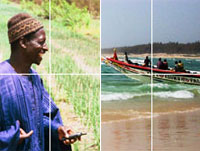 There’s a hard business ethic at work here, with the companies keen to expand the cell phone market into rural areas and grab new customers before the competition steps in.
There’s a hard business ethic at work here, with the companies keen to expand the cell phone market into rural areas and grab new customers before the competition steps in. It used to be that attending a festival was more akin to a long trek in a distant country, with festival-goers vanishing for days on end, uncontactable by the outside world.
It used to be that attending a festival was more akin to a long trek in a distant country, with festival-goers vanishing for days on end, uncontactable by the outside world.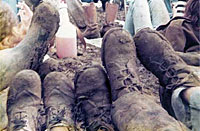 Like Glastonbury, Live 8 and several other big music festivals, band’s performances at the Reading Festival will be available to view over the Web via a streaming Webcast, with official sponsors Tiscali providing the coverage.
Like Glastonbury, Live 8 and several other big music festivals, band’s performances at the Reading Festival will be available to view over the Web via a streaming Webcast, with official sponsors Tiscali providing the coverage. China has opened its first officially licensed clinic for Internet addiction as State media reports growing cases of obsessed Internet gamers whose addiction has caused them to quit school, commit suicide or
China has opened its first officially licensed clinic for Internet addiction as State media reports growing cases of obsessed Internet gamers whose addiction has caused them to quit school, commit suicide or 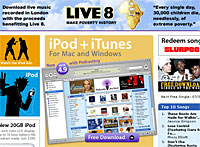 Hot on the heels of the hugely successful Live8 concert in London, Apple’s iTunes Music Store has made the opening performance of The Beatles’s “Sergeant Pepper” (sung by McCartney with U2) available for purchase through its store.
Hot on the heels of the hugely successful Live8 concert in London, Apple’s iTunes Music Store has made the opening performance of The Beatles’s “Sergeant Pepper” (sung by McCartney with U2) available for purchase through its store. Distribution is to be exclusively digital, so there will be no physical product. All profits are to be donated to Live 8, “and the fight for the future of Africa”, according to the iTunes Website.
Distribution is to be exclusively digital, so there will be no physical product. All profits are to be donated to Live 8, “and the fight for the future of Africa”, according to the iTunes Website. Their glorious football team many not be first at anything much these days, but BT have announced that Cardiff and the surrounding area will lead the UK with the implementation of their 21st Century Network (21CN).
Their glorious football team many not be first at anything much these days, but BT have announced that Cardiff and the surrounding area will lead the UK with the implementation of their 21st Century Network (21CN). BT is expected to begin migrating around 350,000 customer lines in the area during the second half of 2006, with the 21CN programme requiring the replacement of equipment in more than 50 local exchanges along with the implementation of new IT systems to make the technology do its stuff.
BT is expected to begin migrating around 350,000 customer lines in the area during the second half of 2006, with the 21CN programme requiring the replacement of equipment in more than 50 local exchanges along with the implementation of new IT systems to make the technology do its stuff. In a pretty gung-ho move that shows a lot of seriousness, the US Department of Justice (DoJ) have announced the results of Operation Site Down. More than 20 raids occurred in Australia, Belgium, Canada, Denmark, France, Germany, Israel, the Netherlands, Portugal and the UK, as well as 70 in the USA.
In a pretty gung-ho move that shows a lot of seriousness, the US Department of Justice (DoJ) have announced the results of Operation Site Down. More than 20 raids occurred in Australia, Belgium, Canada, Denmark, France, Germany, Israel, the Netherlands, Portugal and the UK, as well as 70 in the USA.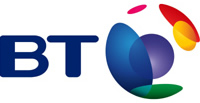
 Sony’s PlayStation Portable is a media hub, but unfortunately, apart from games there isn’t really any content available for it (not forgetting unlucky UK citizens who can’t even officially buy one until September).
Sony’s PlayStation Portable is a media hub, but unfortunately, apart from games there isn’t really any content available for it (not forgetting unlucky UK citizens who can’t even officially buy one until September). Using an Apple Mac has many advantages and ripping DVDs is one of them. Look for an application MacTheRipper, it does exactly what is says on the tin, and takes the MPEG2 information from a DVD while removing region coding, macrovision and other DVD annoyances and stores the resulting files on the hard disk.
Using an Apple Mac has many advantages and ripping DVDs is one of them. Look for an application MacTheRipper, it does exactly what is says on the tin, and takes the MPEG2 information from a DVD while removing region coding, macrovision and other DVD annoyances and stores the resulting files on the hard disk. Windows users don’t despair
Windows users don’t despair It’s not surprising that when an entrepreneur sees something as successful as Skype has been, (you can’t see over 127m downloads in any other way), that the word opportunity is writ large in their eyes. This is especially when that person likes disrupting legacy business models, such as the phone system.
It’s not surprising that when an entrepreneur sees something as successful as Skype has been, (you can’t see over 127m downloads in any other way), that the word opportunity is writ large in their eyes. This is especially when that person likes disrupting legacy business models, such as the phone system. The big differentiator between Gizmo Project (a temporary name – they’re asking for suggestions) and Skype is Gizmo uses the open standard of SIP (Session Initiation Protocol, for those who really want to know), as opposed to the proprietary method Skype uses. This goes after Skype in the only way it can.
The big differentiator between Gizmo Project (a temporary name – they’re asking for suggestions) and Skype is Gizmo uses the open standard of SIP (Session Initiation Protocol, for those who really want to know), as opposed to the proprietary method Skype uses. This goes after Skype in the only way it can. Skype has done well in encouraging other companies to build extra software and importantly, hardware including phone handsets (
Skype has done well in encouraging other companies to build extra software and importantly, hardware including phone handsets (